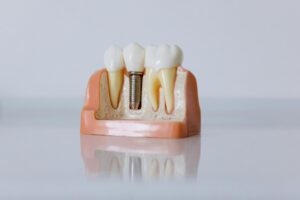Choosing how to replace missing teeth isn’t always simple. With so many options available, it’s important to understand how each one works before moving forward. One of the most common decisions patients face is comparing dental implants vs dentures. Each solution offers distinct advantages, and the right choice often depends on your oral health, budget, and long-term goals.
What Are Dental Implants and Dentures?

To start, it helps to understand what each of these treatments actually involves.
Dental Implants
Dental implants are artificial tooth roots, usually made of titanium, placed directly into the jawbone. Once healed, a crown or bridge is attached to restore your smile. They’re considered a permanent solution and often last for decades with proper care.
A few key things to know about dental implants:
-
They require oral surgery for placement.
-
Healing time can take a few months.
-
They look and feel very close to natural teeth.
-
You’ll need enough healthy bone to support the implant.
Dentures
Dentures are removable appliances used to replace missing teeth. They come in full or partial versions depending on how many teeth are missing. Unlike implants, they sit on the gums and don’t require surgery.
Important features of dentures include:
-
Made from acrylic, metal, or a combination of both.
-
Can be removed and cleaned daily.
-
Generally more affordable upfront.
-
May require adjustments or replacements over time.
Both options have come a long way in terms of comfort and appearance. But how they work and what they demand from you—financially and physically—are very different. That’s why comparing dental implants vs dentures early on is such a helpful step.
Key Differences Between Dental Implants and Dentures
Understanding the main differences between these two options can help you figure out which one fits your needs. Dental implants and dentures both restore missing teeth, but they function in very different ways.
1. Procedure and Placement
-
Dental implants require surgery. A titanium post is placed into the jawbone, followed by a healing period. After that, a crown is attached.
-
Dentures are non-surgical. They are custom-made based on impressions of your mouth and placed over your gums.
2. Appearance and Fit
-
Implants are fixed and look like natural teeth. They don’t move or shift when you talk or eat.
-
Dentures may feel bulkier and can move slightly while speaking or chewing, especially if they don’t fit well.
3. Comfort
-
Implants become part of your jawbone and feel more stable.
-
Dentures can cause gum irritation if they rub or aren’t fitted correctly.
4. Longevity
-
Dental implants are designed to last decades. With good hygiene, many people keep them for life.
-
Dentures typically last 5 to 10 years before needing a replacement or major adjustment.
5. Maintenance
-
Implants are brushed and flossed like natural teeth.
-
Dentures need to be removed daily and cleaned with special solutions. They should also be stored in water or a soaking solution overnight.
6. Cost
-
Implants have a higher upfront cost, but they’re a long-term solution.
-
Dentures are more affordable initially but may require frequent repairs or replacements over time.
These factors make the decision between dental implants vs dentures highly personal. It depends on your health, your expectations, and how much maintenance you’re willing to manage.
Pros and Cons of Each Option
Now that you know the key differences, it’s helpful to weigh the pros and cons of both treatments. This gives a more realistic idea of what to expect with each option.
Dental Implants
Pros:
-
Look and feel like natural teeth
-
Permanently fixed in place
-
Help prevent bone loss in the jaw
-
No special cleaning routines needed
-
Don’t affect nearby teeth
Cons:
-
Higher upfront cost
-
Requires surgery and healing time
-
Not suitable for people with low bone density or certain medical conditions
-
Treatment can take several months
Dentures
Pros:
-
Less expensive at the start
-
Non-invasive, no surgery needed
-
Quicker to get fitted and adjusted
-
Can be a good option for people with significant bone loss
Cons:
-
May slip or move while eating or talking
-
Can cause gum soreness or pressure points
-
Need to be removed and cleaned daily
-
Might need frequent adjustments or replacement
These pros and cons highlight how lifestyle, comfort, and long-term goals should influence your choice. For many patients, the decision between dental implants vs dentures comes down to what they can manage both physically and financially over time.
Dental Implants vs Dentures: Which Factors Should You Consider?
Choosing between these two options isn’t just about cost or convenience. Several important factors can influence what works best for your situation. Thinking through these areas can help guide your decision.
Your Oral Health
-
If you have strong, healthy gums and enough jawbone, implants may be the better option.
-
For patients with bone loss or gum disease, dentures may be more practical unless bone grafting is done.
Budget and Insurance
-
Implants can be more expensive upfront, and not all insurance plans cover them.
-
Dentures usually cost less and are more likely to be partially covered.
Lifestyle and Daily Habits
-
Implants offer more stability for those who eat a wide range of foods.
-
Dentures might require you to adjust your diet slightly, especially with sticky or hard foods.
Age and Medical Conditions
-
Younger patients may benefit more from long-term implant solutions.
-
People with certain health issues may not be ideal candidates for oral surgery.
Time and Recovery
-
Implants involve multiple visits and a healing period of a few months.
-
Dentures can be fitted in a shorter time frame and don’t require surgery.
Each of these points plays a role in figuring out what fits your needs best. When comparing dental implants vs dentures, these factors often point to the most practical solution for your lifestyle and oral health.
Who Is a Good Candidate for Each?
Not everyone is suited for the same type of tooth replacement. Knowing which option fits your situation can make the process smoother and lead to better long-term results.
Candidates for Dental Implants
You may be a strong candidate for implants if:
-
You have one or more missing teeth
-
Your jawbone is healthy and strong
-
You don’t smoke or are willing to stop
-
You’re in good overall health
-
You want a permanent, low-maintenance solution
Implants work best for those who can commit to the healing process and want something that functions just like real teeth.
Candidates for Dentures
Dentures could be a better fit if:
-
You have significant tooth loss
-
Your bone structure won’t support implants
-
You prefer a non-surgical option
-
You’re looking for something more affordable upfront
-
You need a quicker solution
Dentures are especially helpful for patients with more complex dental histories or limited bone density.
Before deciding between dental implants vs dentures, your dentist will likely examine your mouth, review your health history, and discuss your goals to help find the most practical and effective solution.
Dental Implants vs Dentures: Which One Offers the Best Long-Term Value?
When thinking about cost and durability, it’s important to look beyond the initial price. Long-term value includes how well the solution holds up over time, how much maintenance it needs, and what kind of oral health benefits it provides.
Initial Cost vs Lifetime Investment
-
Dental implants typically cost more upfront, but they rarely need replacement. Many last 20 years or more.
-
Dentures are less expensive at the start, but they often need adjustments, repairs, or full replacement every few years.
Durability and Wear
-
Implants are fixed in place and highly durable. You can eat, brush, and live without worrying about them shifting.
-
Dentures are more fragile. They can break if dropped and may wear down with daily use.
Maintenance Costs
-
Implant maintenance is similar to caring for natural teeth—regular brushing, flossing, and dental checkups.
-
Dentures require cleaning solutions, storage cases, and possibly adhesives, which can add to their overall cost.
Oral Health Benefits
-
Implants help prevent jawbone loss by stimulating the bone during chewing.
-
Dentures do not offer this benefit and may even accelerate bone shrinkage over time.
So, in comparing dental implants vs dentures, implants tend to offer more value if you’re looking at the big picture. They require a larger investment upfront, but they often come with fewer long-term costs and more health benefits.
What Do Patients Typically Prefer?
Preferences vary depending on personal goals, health, and lifestyle—but some patterns do stand out. When given the choice and the right conditions, many patients lean toward one option over the other for specific reasons.
Common Reasons Patients Choose Dental Implants
-
They want a solution that feels permanent and doesn’t come out.
-
The appearance of implants closely matches natural teeth.
-
There’s no extra cleaning routine or adhesive required.
-
They want to preserve bone health and avoid facial changes over time.
Why Others Choose Dentures
-
The cost is more manageable upfront.
-
It’s a non-surgical route, which can be less intimidating.
-
Some patients have health conditions that prevent implant surgery.
-
They may need a quicker solution due to an upcoming event or health concern.
Surveys and clinical feedback show that those who choose implants often report higher satisfaction in the long term—mainly due to stability, comfort, and appearance. But many denture users are also happy with their results, especially with a well-fitted appliance and good follow-up care.
Your own preference will come down to what matters most to you. Comparing dental implants vs dentures is about balancing function, comfort, time, and cost—so you end up with something you feel confident wearing every day.
Final Thoughts: Dental Implants vs Dentures – Making Your Decision
When deciding between dental implants vs dentures, there’s no one-size-fits-all answer. The right choice depends on your current oral health, budget, and how you want your smile to function over time. Both options have their strengths, and both can restore confidence and comfort—just in different ways.
Here’s a quick recap to help you compare:
-
Dental Implants
-
Long-lasting and stable
-
Look and feel like natural teeth
-
Require surgery and higher upfront cost
-
Support jawbone health
-
-
Dentures
-
Lower initial cost
-
Non-surgical and quicker to get
-
Require more maintenance and adjustments
-
May be better for those with extensive tooth or bone loss
-
The most important step is consulting with your dentist or oral surgeon. They’ll assess your mouth, review your health history, and guide you through the decision-making process with your needs in mind.
Take the First Step Toward a Stronger, More Confident Smile
If you’ve been weighing the pros and cons of dental implants vs dentures, it’s time to get expert guidance. At Advanced Emerald Dentistry, our experienced team will help you explore the best tooth replacement option based on your health, goals, and lifestyle. We’ll walk you through the process with clear answers and trusted care.
Contact Advanced Emerald Dentistry today to schedule a consultation. Our team is here to support you with personalized treatment options that protect your oral health and help you feel confident in your smile again.


